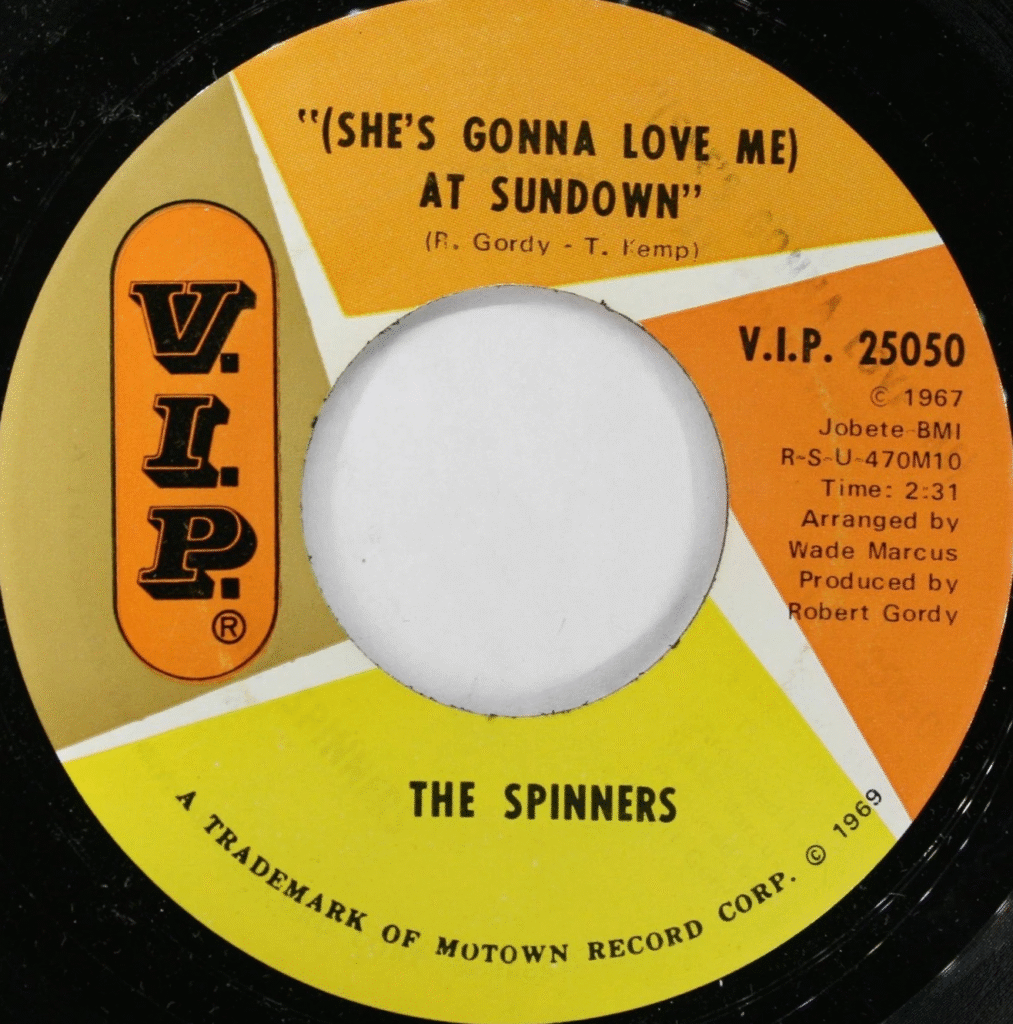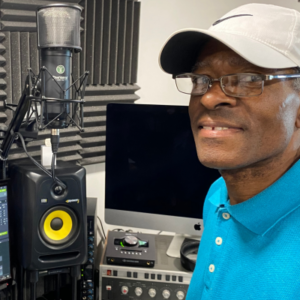The Spinners came on to the Motown roster when Berry Gordy bought Tri-Phi Records from Harvey Fuqua. They had enjoyed chart success with their first recording for Fuqua in 1961, “That’s What Girls Are Made For”, a song co-written by Gwen Gordy and Harvey Fuqua, with Marvin Gaye playing drums.

The single reached number twenty-seven on the Billboard Hot 100 Singles Chart and number five on the Billboard R&B Singles Chart. However, five further singles were released on Tri-Phi but none made much impact. The group that joined Motown in 1963 consisted of four founder members from 1954, viz. Henry Fambrough, Pervis Jackson, Billy Henderson and Bobby Smith, plus George Dixon who had replaced original member C.P. Spencer in 1956.

They had to wait until 1964 for the release of their first single on the Motown label, a Mickey Stevenson composition entitled “Sweet Thing”, which failed to chart. The group then waited over a year for the follow-up to be issued. Just one single, “Truly Yours”, was released in March 1966 on the Motown label. The song was co-written and produced by Mickey Stevenson and Ivy Jo Hunter, peaking at number sixteen on the Billboard R&B Singles Chart. It is a typical Motown up-tempo ballad. The B-side, “Where Is That Girl”, written and produced by Johnny Bristol and Harvey Fuqua, is slower and smoother. Both tracks are good, which makes it hard to understand why the group wasn’t promoted more.

Motown released the first album by the Spinners in August 1967, entitled “The Original Spinners” in the US but “The Detroit Spinners” in the UK, to avoid a name clash with a popular UK folk group. The collection of songs starts with the Gordy/Fuqua track “That’s What Girls Are Made For” released on Tri-Phi in 1961 and also includes several of the group’s Motown singles, including their 1967 release “For All We Know”. One of the best tracks on the album is the B-side of this single, a song written by Mickey Stevenson and Ivy Jo Hunter (who produced the track too) entitled “I’ll Always Love You”. The complete album plus a number of bonus tracks were issued by Ace Records UK in 2000, with the title “Truly Yours”.
The Spinners were still struggling to make their mark at Motown, having started out in 1961 with Harvey Fuqua at Tri-Phi and stayed loyal to the company for four years, despite being given very limited opportunities. Just one single was released by Motown in 1968, “Bad, Bad Weather (Till You Come Home)”, co-written by Horgay Gordy, Allen Story and Lawrence Brown, and produced by George Gordy. It is a good up-tempo dance tune, well sung with solid harmonies. The B-side, “I Just Can’t Help But Feel The Pain”, was produced by Fuqua and co-written by him too along with Clyde Wilson (Steve Mancha). It is another foot-tapper, that should have sold better than it did. Another year went by without a hit. It is hard to believe that the group’s members continued believing in their talent and were prepared to wait for someone or something to change their luck.

Things were not about to get any better! Just one single was released in 1969 on the VIP label; a slow, romantic ballad entitled “In My Diary”, arranged by Willie Shorter and produced by Johnny Bristol in a Doo-Wop style. Producer Robert Gordy did a better job with the B-side, the up-tempo “(She’s Gonna Love Me) At Sundown”, which he co-wrote with Thomas Kemp. The group’s output was good, but their luck didn’t improve.

They began 1970 with a new single release from VIP on 12th February, a cover of the Temptations’ “Message From A Black Man”, which is a powerful statement from the pens of Barrett Strong and Norman Whitfield, arranged by Hank Cosby and produced by Johnny Bristol. The group is determined to be taken seriously, but sadly the song didn’t make a chart entry.
They were finally given the chance to release their second album in 1970, after a series of seven singles on Tri-Phi (1961-1963), five singles and one album on Motown (1964-1968), and one single on Motown’s VIP label in 1969. The thirteen singles had produced just two hits, both of which had made the top eight on the Billboard R&B Singles Chart. The group had potential with the right songs, obviously, but were not pushed by Motown prior to 1970. They had spent time working as chaperones, chauffeurs and in other support roles. Now, they had a second try with another album.

“Second Time Around” (an ironic title?) is a collection of twelve songs, eight from Motown songwriters plus four non-Motown covers. There is quite a range of styles, starting with the funky ballad “It’s A Shame”, co-written by Stevie Wonder, Syreeta Wright and Lee Garrett. There are two good Soul ballads, “Bad, Bad Weather” and “Pay Them No Mind”, and the slow Doo-Wop number “In My Diary”, recorded by the Moonglows in 1955. The classic medley “Can Sing A Rainbow/ Love Is Blue” is given a funky up-grade. The best performance on the album is the cover of David Ruffin’s “My Whole World Ended (The Moment You Left Me)”, co-written by Fuqua, Roach, Bristol and Sawyer, and given a new arrangement by David Van DePitte.

The opening track “It’s A Shame” was issued as a single by VIP in June, well in advance of the album release. Stevie Wonder took charge of production and Paul Riser wrote the arrangements. It sold well, climbing to number fourteen on the Billboard Hot 100 Singles Chart and number four on the Billboard R&B Singles Chart, their highest result so far.

Another Stevie Wonder/Syreeta Wright song (Wright is credited as S. Morris), “We’ll Have It Made”, was chosen for single release on 21st December, backed by the David Ruffin cover “My Whole World Ended (The Moment You Left Me)”. It also took the Spinners into the charts, reaching number eighty-nine on the Billboard Hot 100 Singles Chart and number twenty on the Billboard R&B Singles Chart in early 1971. It was to be the group’s final release at Motown.
It was clear that Motown hadn’t devoted enough resources to building the group’s reputation. They knew it and so did Aretha Franklin, who suggested that they join Atlantic Records. The Spinners were in the middle of recording songs for a new album with Stevie Wonder as producer, when their existing Motown contract came to an end. It was probably a difficult choice, as G.C. Cameron had joined the group as co-lead singer in 1967 and was on a separate contract which was still in operation. He couldn’t switch to Atlantic. Nevertheless, he could see that the group could be so much more successful elsewhere, so he encouraged a decision in favour of Atlantic and persuaded his cousin Philippé Wynne to take his place.
Good things lay ahead for them: a first R&B number one in 1972 and a first Hot 100 number one in 1974. For Motown, it was a stark lesson! Berry Gordy didn’t make many mistakes when it came to spotting talent and developing it, but he failed with the Spinners. Atlantic delivered the success that the group really deserved.

















